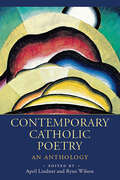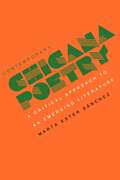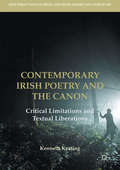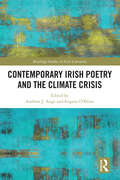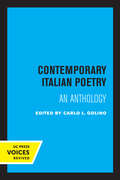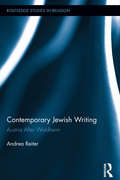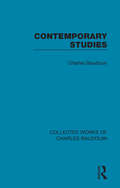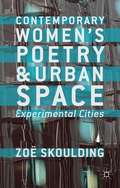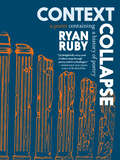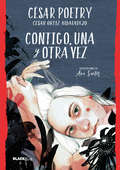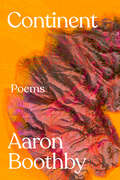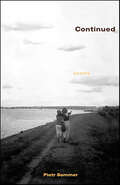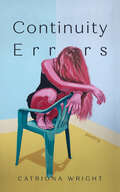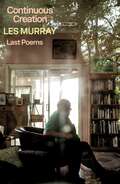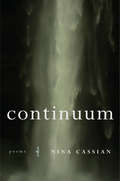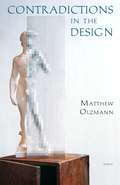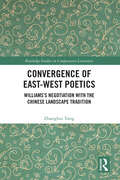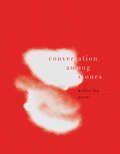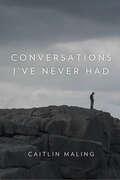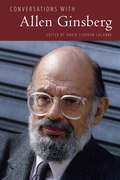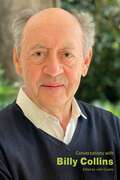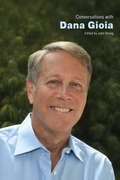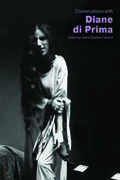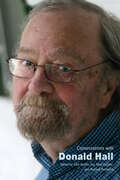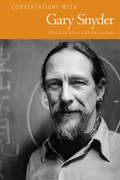- Table View
- List View
Contemporary Catholic Poetry: An Anthology
by April Lindner Ryan WilsonFeaturing 23 contemporary Catholic poets, from Julia Alvarez and Carolyn ForchÉ to Timothy Murphy and Franz Wright, this anthology is an essential collection that captures the spectrum of the Catholic experience.
Contemporary Chicana Poetry: A Critical Approach to an Emerging Literature
by Marta E. SanchezIn this first book-length study of the works of Chicano women writers, Marta Ester Sanchez introduces the reader to a group of Chicanas who in the 1970s began to reexamine and reevaluate their gender and cultural identity through poetic language. The term 'Chicana' refers here to women of Mexican heritage who live and write in the United States. The works of four contemporary Chicana poets---Alma Villanueva, Lorna Dee Cervantes, Lucha Corpi, and Bernice Zamora---are the focus of this volume.
Contemporary Irish Poetry and the Canon: Critical Limitations and Textual Liberations (New Directions in Irish and Irish American Literature)
by Kenneth Keating'This book makes an important intervention into debates about influence and contemporary Irish poetry. Supported throughout by incisive reflections upon allusion, word choice, and formal structure, Keating brings to the discussion a range of new and lesser known voices which decisively complicate and illuminate its pronounced concerns with inheritance, history, and the Irish poetic canon. ' -- Steven Matthews, Professor of English Literature, University of Reading, UK, and author of Irish Poetry: Politics, History, Negotiation and Yeats As Precursor This book is about the way that contemporary Irish poetry is dominated and shaped by criticism. It argues that critical practices tend to construct reductive, singular and static understandings of poetic texts, identities, careers, and maps of the development of modern Irish poetry. This study challenges the attempt present within such criticism to arrest, stabilize, and diffuse the threat multiple alternative histories and understandings of texts would pose to the formation of any singular pyramidal canon. Offered here are detailed close readings of the recent work of some of the most established and high-profile Irish poets, such as Paul Muldoon and Medbh McGuckian, along with emerging poets, to foreground an alternative critical methodology which undermines the traditional canonical pursuit of singular meaning and definition through embracing the troubling indeterminacy and multiplicity to be found within contemporary Irish poetry.
Contemporary Irish Poetry and the Climate Crisis (Routledge Studies in Irish Literature)
by Andrew J. Auge and Eugene O’BrienContemporary Irish Poetry and the Climate Crisis addresses what is arguably the most crucial issue of human history through the lens of late-twentieth and early twenty-first-century Irish poetry. The poets that it surveys range from familiar presences in the contemporary Irish literary canon – Seamus Heaney, Derek Mahon, Paula Meehan, Moya Cannon – to lesser-known figures, such as the experimental poet Maurice Scully, contemporary poets Stephen Sexton and Sean Hewitt, and the Irish-language poets Simon Ó Faoláin, Bríd Ní Mhóráin, and Máire Dinny Wren. Adopting a variety of ecotheoretical approaches, the essays gathered here address several interrelated themes crucial to the climate crisis: the way in which the scalar scope of climate change interweaves local and global, distant past and imminent future, nature and culture; the critical importance of acknowledging the complex kinship of the human and nonhuman; and the necessity of warning against the devastating environmental losses to come while mourning those that already occurred. Ultimately, by envisioning new ways of existing on an earth that humans no longer dominate, this book engages in what the philosopher Jonathan Lear refers to as a process of ‘radical anticipation’.
Contemporary Italian Poetry: An Anthology
by Carlo L. GolinoThis title is part of UC Press's Voices Revived program, which commemorates University of California Press’s mission to seek out and cultivate the brightest minds and give them voice, reach, and impact. Drawing on a backlist dating to 1893, Voices Revived makes high-quality, peer-reviewed scholarship accessible once again using print-on-demand technology. This title was originally published in 1962.
Contemporary Jewish Writing: Austria After Waldheim (Routledge Studies in Religion #33)
by Andrea ReiterThis book examines Jewish writers and intellectuals in Austria, analyzing filmic and electronic media alongside more traditional publication formats over the last 25 years. Beginning with the Waldheim affair and the rhetorical response by the three most prominent members of the survivor generation (Leon Zelman, Simon Wiesenthal and Bruno Kreisky) author Andrea Reiter sets a complicated standard for ‘who is Jewish’ and what constitutes a ‘Jewish response.’ She reformulates the concepts of religious and secular Jewish cultural expression, cutting across gender and Holocaust studies. The work proceeds to questions of enacting or performing identity, especially Jewish identity in the Austrian setting, looking at how these Jewish writers and filmmakers in Austria ‘perform’ their Jewishness not only in their public appearances and engagements but also in their works. By engaging with novels, poems, and films, this volume challenges the dominant claim that Jewish culture in Central Europe is almost exclusively borne by non-Jews and consumed by non-Jewish audiences, establishing a new counter-discourse against resurging anti-Semitism in the media.
Contemporary Studies (Collected Works of Charles Baudouin)
by Charles BaudouinOriginally published in 1924, this title is divided into four parts, each looking at contemporary issues. Beginning with ‘The Liberators of the Mind’, the author discusses important thinkers of the time, such as Tolstoy and Nietzsche. The second part looks at ‘The War and the Peace’, which refers to the recently fought First World War. He then moves on to ‘Education and Society’, where discussions include Bahaism and Father Christmas. The final part looks at ‘Art and Criticism’, discussing the trends of French post-war poetry – realism, symbolism and dynamism – followed by a look at dynamic drawing. This volume is available again after many years out of print.
Contemporary Women’s Poetry and Urban Space: Experimental Cities
by Zoë SkouldingThis book focuses on the role of the city, and its processes of mutual transformation, in poetry by experimental women writers. Readings of their work are placed in the context of theories of urban space, while new visions of the contemporary city and its global relationships are drawn from their innovations in language and form.
Context Collapse: A Poem Containing a History of Poetry
by Ryan RubyLiterary critic Ryan Ruby uncovers the secret history of poetry in a mock-academic verse essay filled with wit and wisdom.One of Publishers Weekly's Best Books of 2024Prophet. Entertainer. Courtier. Criminal. Revolutionary. Critic. Scholar. Nobody. Epic in sweep, Context Collapse is the secret history of the poet—from Bronze Age Greece and Renaissance Italy to the cafés of Grub Street and the Latin Quarter, from the creative writing departments of the American Midwest to the boardrooms of Silicon Valley. Cheekily introducing academic discourse, media studies, cybersemiotics, literary sociology, and heterodox economics into his blank verse study of poetry, Ruby traces the always delicate dance between poets, their publishers, and their audiences, and shows how, time and time again, the social, technological, and aesthetic experiments that appear in poetic language have prefigured radical changes to the ways of life of millions of people. It is precisely to poets to whom we ought to turn to catch a glimpse, as Shelley once put it, of the &“gigantic shadows futurity casts on the present.&”
Contigo, una y otra vez (Colección #BlackBirds)
by César PoetryCésar Poetry presenta una novela sensible y elegante sobre el amor, la soledad y la felicidad, acompañada de las bellas ilustraciones de Ana Santos. La vida da muchas vueltas, pero, a veces, no nos damos cuenta de que la Tierra es redonda y siempre hay una oportunidad para volver a empezar. <P><P>Y quien realmente merece la pena está dispuesto a darlas contigo, sujetando todos y cada uno de tus miedos. Eso es lo que encontrarás en estas páginas. Aquí dentro podría contarse tu historia, la historia de cómo las pequeñas cosas hacen que el corazón nos lata un poquito más deprisa. Antes de comenzar a leer este libro, deberías preguntarte lo siguiente: Si mañana todo acabara, ¿repetirías lo que estás haciendo hoy con esa persona? Yo lo tengo claro: «Contigo, una y otra vez.» <P>#BlackBirds un refugio íntimo de papel. Libros irresistibles para leer, guardar y compartir. Es una nueva colección de espíritu indie y juvenil con contenido de no-ficción moderno: poesía, microcuentos, reflexiones, diarios... Su diseño rompedor y la colaboración de conocidos ilustradores, bloggers e instagrammers dan vida a estos libros que son pequeñas obras de arte, caprichos, que todos querremos tener, leer y atesorar.
Continent: Poems
by Aaron Boothby&“These poems buckle and drift in ways that reveal their continental scope. The I of these poems offers its critical lament, but it never overlooks beauty.&” --Kaie KelloughThe poems in Continent ask to be done with presuming, knowing, and defining. They trace maps laid across lands and peoples by force, voiced by a speaker both engaged in attendingto this ongoing violence and unable to escape complicity with it. Urgent, visceral, emotionally striking, Aaron Boothby&’s debut collection asks the question: how can we see, listen, and feel an ongoing catastrophe and look for what is beyond it?
Continued: Poems (Wesleyan Poetry Series)
by Piotr SommerContinued is a selection of poems by Piotr Sommer, spanning his career to date. A kind of poetic utterance, these "talk poems" are devoid of any singsong quality yet faithfully preserve all the melodies and rhythms of colloquial speech. Events and objects of ordinary, everyday life are related and described by the speaker in a deliberately deadpan manner. Yet a closer look at the language he uses, with all its ironic inflections and subtle "intermeanings," reveals that the poem's "message" should be identified more with the way it is spoken than with what it says. The poems in this volume were translated into English with the help of other notable poets, writers, and translators, including John Ashbery, D.J. Enright, and Douglas Dunn.
Continuity Errors
by Catriona WrightCBC BOOKS CANADIAN POETRY COLLECTIONS TO WATCH FOR IN SPRING 2023Feminist poems both serious and absurd that question our obsession with productivity instead of with care.Continuity Errors questions the privileging of work and productivity over rest and care from an ecological and feminist perspective. Written before and immediately after the birth of her first child, these poems try to imagine the future her son will inherit. Encounters with an unusual cast of characters – including lonely cryptids, unrepentant grifters, and persistent ghosts – provide incomplete answers, and while the continuity errors keep multiplying around her, Wright pauses to consider whether our devotion to innovation is keeping us stuck."Catriona Wright's Continuity Errors is a book of snaking moves and sneaking intellect, a book of style and fortitude and sass. Wright's always sharp and often eerie interrogations lead us through a world of cryptocurrency, grunt work, predictive policing, extinction, haute cuisine, billboard ads, smoke breaks, breast pumps; these are poems for our moment of onslaught and bewilderment that, having had the world forced down their throats, spit back." – Natalie Shapero, author of Popular Longing
Continuous Creation: Last Poems
by Les MurrayThe final collection of poems by the great Australian poet Les Murray, Continuous CreationWe bring nothing into this worldexcept our gradual abilityto create it, out of all that vanishesand all that will outlast us.In Continuous Creation, the final collection from Les Murray, the preeminent poet of modern Australia recalls moments from his youth and wryly observes the changing world, moving back and forth through time and history with characteristic curiosity and an ever-fresh commitment to capturing the rhythms of life in verse. This collection displays Murray’s miraculous ability to reinvent language in order to plant his and our reality on the page, whether he writes about the Australian landscape (“Kangaroo sleeping / ahead on the road turns out / to be twigs and leaves”) or unsold books sitting in department stores.Continuous Creation demonstrates, once more, that Murray was one of the great poets of the English language. As Joseph Brodsky said, he was, “quite simply, the one by whom the language lives.”
Continuum: Poems
by Nina Cassian"The poems in this work show Cassian to be . . . a poet who can work miracles with language."--Library Journal Spanning nearly sixty years, these poems--both new English compositions and Nina Cassian's translations of her work in Romanian--blend her gallows humor with an engagement with the human experience.
Contradictions in the Design
by Matthew OlzmannThese political poems employ humor to challenge the cultural norms of American society, focusing primarily on racism, social injustices and inequality. Simultaneously, the poems take on a deeper, personal level as it carefully deconstructs identity and the human experience, piecing them together with unflinching logic and wit. Olzmann takes readers on a surreal exploration of discovery and self-evaluation.
Convergence of East-West Poetics: Williams’s Negotiation with the Chinese Landscape Tradition (Routledge Studies in Comparative Literature)
by Zhanghui YangThe present book examines William Carlos Williams’s negotiation with cultural modes and systems of the Chinese landscape tradition in his landscape writing. Focusing on Walliams’s landscape modes of landscape with(out) infused emotions, the book builds a linkage between their interactions with Chinese landscape aesthetics and shows how these conversations helped shape Williams’s cross-cultural landscape poetics. The exploration of Williams’s experiment with the Chinese serene interplay of self and landscape, the interfusion of scene and emotion, an idea of seeing from the perspective of Wang Guowei’s theory of jingjie, and the poetic space of frustration and completion in the context of space and human geography, expand the understanding of a cross-cultural landscape tradition developed by Williams through bringing into focus the convergence of East-West poetics.
Conversation Among Stones
by Willie LinAwakening to histories personal and social, Conversation Among Stones is a meditation on memory and identity. Through fields of wild grass, restless seascapes, and cities tinged with sand, Willie Lin's debut collection of poetry questions what can remain and what must be pared away in our search for truth. Conversation Among Stones speaks both to the inanimate—misremembered histories, photographs, the dead—and to the voices in our daily lives that reverberate with disagreement and confusion. Punctuated by doubt and resistant to easy transformations, these poems listen and revise. With striking restraint and simultaneous abundance, these poems attempt to reconcile the desire for answers with the necessity of not knowing.Turn by turn, this collection catalogs moments of approach, fervor, and strife and carries us into a profound quest for understanding: “And that was one conviction: / that we must be to one another / what the world is not / to us.”
Conversations I've Never Had
by Caitlin MalingCaitlin Maling's first collection is at heart a poetry of place. Cervantes, Donnelly River, Yallingup, Fremantle, Leonora, and beyond are richly evoked in poems ranging stylistically from accomplished mature lyrics and the confessional to narratives of raw power and feeling. Restlessly questioning and frequently allusive, slipping between promise and possibility, Maling's poems are invested in the actuality of the world, exploring the landscapes of memory and the brief moment of now.
Conversations with Allen Ginsberg (Literary Conversations Series)
by David Stephen CalonneAllen Ginsberg (1926–1997) was one of the most famous American poets of the twentieth century. Yet, his career is distinguished by not only his strong contributions to literature but also social justice. Conversations with Allen Ginsberg collects interviews from 1962 to 1997 that chart Ginsberg’s intellectual, spiritual, and political evolution.Ginsberg’s mother, Naomi, was afflicted by mental illness, and Ginsberg’s childhood was marked by his difficult relationship with her; however, he also gained from her a sense of the necessity to fight against social injustice that would mark his political commitments. While a student at Columbia University, Ginsberg would meet Jack Kerouac, William S. Burroughs, and Gregory Corso, and the Beat Generation was born. Ginsberg researched deeply the social issues he cared about, and this becomes clear with each interview. Ginsberg discusses all manner of topics including censorship laws, the legalization of marijuana, and gay rights. A particularly interesting aspect of the book is the inclusion of interviews that explore Ginsberg’s interests in Buddhist philosophy and his intensive reading in a variety of spiritual traditions. Conversations with Allen Ginsberg also explores the poet’s relationship with Bob Dylan and the Beatles, and the final interviews concentrate on his various musical projects involving the adapting of poems by William Blake as well as settings of his own poetry. This is an essential collection for all those interested in Beat literature and twentieth-century American culture.
Conversations with Billy Collins (Literary Conversations Series)
by John CusatisBilly Collins “puts the ‘fun’ back in profundity,” says poet Alice Fulton. Known for what he has called “hospitable” poems, which deftly blend wit and erudition, Collins (b. 1941) is a poet of nearly unprecedented popularity. His work is also critically esteemed and well represented in The Norton Anthology of American Literature. An English professor for five decades, Collins was fifty-seven when his poetry began gathering considerable international attention. Conversations with Billy Collins chronicles the poet’s career beginning with his 1998 interview with Terry Gross on Fresh Air, which exponentially expanded his readership, three years prior to his being named United States Poet Laureate. Other interviewers range from George Plimpton, founder of the Paris Review, to Pulitzer Prize–winning poet Henry Taylor to a Presbyterian pastor, a physics professor, and a class of AP English Literature students. Over the course of the twenty-one interviews included in the volume, Collins discusses such topics as discovering his persona, that consistently affable voice that narrates his often wildly imaginative poems; why poetry is so loved by children but often met with anxiety by high school students; and his experience composing a poem to be recited during a joint session of Congress on the first anniversary of 9/11, a tragedy that occurred during his tenure as poet laureate. He also explores his love of jazz, his distaste for gratuitously difficult poetry and autobiographical poems, and his beguiling invention of a mock poetic form: the paradelle. Irreverent, incisive, and deeply life-affirming—like his twelve volumes of poetry—these interviews, gathered for the first time in one volume, will edify and entertain readers in the way his sold-out readings have done for the past quarter century.
Conversations with Dana Gioia (Literary Conversations Series)
by John ZhengConversations with Dana Gioia is the first collection of interviews with the internationally known poet and public intellectual, covering every stage of his busy, polymathic career. Dana Gioia (b. 1950) has made many contributions to contemporary American literature and culture, including but not limited to crafting a personal poetic style suited to the age; leading the revival of rhyme, meter, and narrative through New Formalism; walloping the “intellectual ghetto” of American poetry through his epochal article “Can Poetry Matter?”; helping American poetry move forward by organizing influential conferences; providing public service and initiating nationwide arts projects such as Poetry Out Loud through his leadership of the National Endowment for the Arts; and editing twenty best-selling literary anthologies widely used in American classrooms. Taken together, the twenty-two collected interviews increase our understanding of Gioia’s poetry and poetics, offer aesthetic pleasure in themselves, and provide a personal encounter with a writer who has made poetry matter. The book presents the actual voice of Dana Gioia, who speaks of his personal and creative life and articulates his unique vision of American culture and poetry.
Conversations with Diane di Prima (Literary Conversations Series)
by David Stephen CalonneDiane di Prima (1934–2020) was one of the most important American poets of the twentieth century, and her career is distinguished by strong contributions to both literature and social justice. Di Prima and LeRoi Jones (Amiri Baraka) edited The Floating Bear (1962–69), one of the most significant underground publications of the sixties. Di Prima’s poetry and prose chronicle her opposition to the Vietnam War; her advocacy of the rights of Blacks, Native Americans, and the LGBTQ community; her concern about environmental issues; and her commitment to creating a world free of exploitation and poverty. In addition, di Prima is significant due to her challenges to the roles that American women were expected to play in society. Her Memoirs of a Beatnik was a sensation, and she talks about its lasting impact as well. Conversations with Diane di Prima presents twenty interviews ranging from 1972 to 2010 that chart di Prima’s intellectual, spiritual, and political evolution. From her adolescence, di Prima was fascinated by occult, esoteric, and magical philosophies. In these interviews readers can see the ways these concepts influenced both her personal life and her poetry and prose. We are able to view di Prima’s life course from her year at Swarthmore College; her move back to New York and then to San Francisco; her studies of Zen Buddhism; her fascination with the I Ching, Paracelsus, John Dee, Heinrich Cornelius Agrippa, alchemy, Tarot, and Kabbalah; and her later engagement with Tibetan Buddhism and work with Chögyam Trungpa. Another particularly interesting aspect of the book is the inclusion of interviews that explore di Prima’s career as an independent publisher—she founded Poets Press in New York and Eidolon Editions in California—and her commitment to promoting writers such as Audre Lorde. Taken together, these interviews reveal di Prima as both a writer of genius and an intensely honest, direct, passionate, and committed advocate of a revolution in consciousness.
Conversations with Donald Hall (Literary Conversations Series)
by John Martin-Joy, Allan Cooper and Richard RohfritchConversations with Donald Hall offers a unique glimpse into the creative process of a major American poet, writer, editor, anthologist, and teacher. The volume probes in depth Hall’s evolving views on poetry, poets, and the creative process over a period of more than sixty years. Donald Hall (1928–2018) reveals vivid, funny, and moving anecdotes about T. S. Eliot, Ezra Pound, and the sculptor Henry Moore; he talks about his excitement on his return to New Hampshire and the joys of his marriage with Jane Kenyon; and he candidly discusses his loss and grief when Kenyon died in 1995 at the age of forty-seven. The thirteen interviews range from a detailed exploration of the composition of “Ox Cart Man” to the poems that make up Without, an almost unbearable poetry of grief that was written following Jane Kenyon’s death. The book also follows Hall into old age, when he turned to essay writing and the reflections on aging that make up Essays after Eighty. This moving and insightful collection of interviews is crucial for anyone interested in poetry and the creative process, the techniques and achievements of modern American poetry, and the elusive psychology of creativity and loss.
Conversations with Gary Snyder (Literary Conversations Series)
by David Stephen CalonneGary Snyder (b. 1930) is one of the most distinguished American poets, remarkable both for his long and productive career and for his equal contributions to literature and environmental thought. His childhood in the Pacific Northwest profoundly shaped his sensibility due to his contact with Native American culture and his early awareness of the destruction of the environment by corporations. Although he emerged from the San Francisco Renaissance with writers such as Kenneth Rexroth, Robert Duncan, and William Everson, he became associated with the Beats due to his friendships with Allen Ginsberg and Jack Kerouac, who included a portrait of Snyder as Japhy Ryder in his novel The Dharma Bums. After graduating from Reed College, Snyder became deeply involved with Zen Buddhism, and he spent twelve years in Japan immersed in study.Conversations with Gary Snyder collects interviews from 1961 to 2015 and charts his developing environmental philosophy and his wide-ranging interests in ecology, Buddhism, Native American studies, history, and mythology. The book also demonstrates the ways Snyder has returned throughout his career to key ideas such as the extended family, shamanism, poetics, visionary experience, and caring for the environment as well as his relationship to the Beat movement. Because the book contains interviews spanning more than fifty years, the reader witnesses how Snyder has evolved and grown both as a poet and philosopher of humanity's proper relationship to the cosmos while remaining committed to the issues that preoccupied him as a young man.
